In today’s digital markets, the importance of data cannot be overstated. But, collecting data alone won’t cut it. One needs to process the data to create useful information from which to derive actionable insights. This is why many companies are looking to leverage their data to understand the market better and create a competitive edge. And, this does not exclude startups—especially those in tech. However, it is not only such companies that can benefit by adopting a business intelligence software solution. With virtually everything being online or moving to it, every company cannot afford to not be “in tech.”
Not all startups, however, can afford standalone powerful analytic tools. Thus, many still use legacy spreadsheet platforms like Excel, which make tracking complex data from different sources quite difficult. But those in the know are aware that there are powerful business intelligence platforms that are free and are perfect for small or new companies. In this article, we are going to introduce 10 of the most affordable BI solution for startups.

Affordable BI Solutions for Startup Companies Table of Contents
The majority of start-ups have modest budgets. In fact, in a research on Startup Funding, the average budget of a startup is approximately $6,000 in the United Kingdom. For the most basic inclusions alone, the budget would already have to cover costs for employees, marketing, borrowing costs, research, and technological expenses. Hence, start-ups can’t afford to make any errors to get the best out of every dollar invested. This includes getting the right software in the growing BI market.
Source: The Company Warehouse
The BI and analytics market was expected to grow up to $20 billion by 2019 due to the increasing demand for this solution not just from large enterprises, but from startups and SMBs as well. The use of BI apps has already become mainstream, especially as their costs are not that much of a barrier anymore. And, according to recent business intelligence software statistics, it is one of the most used types of software for research. So, businesses that want to gain and keep an edge over the competition, are starting to get their hands on this valuable solution.
With innovative technologies in the market, SaaS-designed platforms and cloud-enabled services are already available to startups without costing them an arm and leg to deploy. This makes it possible for startups to facilitate various BI strategies without spending much on infrastructure expenses and leveraging the power of a data-driven approach.
But do startups have big data to start with?
Before delving into what are BI solutions that are affordable for startup companies (you can head straight to the list here), let’s first tackle the elephant in the room: do startups have big data for a BI solution to be truly useful? The short answer is a qualified yes.
When you talk about business intelligence, big data is a buzzword that always comes next right around the corner. Gartner, a research and advisory firm, defines big data as data with high volume, velocity, and variety. It’s also worth noting that in many cases, determining how “big” the big data is relative to the organization’s size. Depending on your company’s frame of reference, five terabytes of data may not be much for larger enterprises but it may be huge for midsized businesses.
Business intelligence is often associated with big enterprises with big data sets. However, big data doesn’t just refer to size as it also includes variety and velocity. Furthermore, BI tools are not just for big data. First and foremost, BI is a set of tools to retrieve, analyze, and transform data into meaningful information. Data is just data without extracting the relevant and important pieces and performing an analysis to help businesses make intelligent decisions.
Here’s how startups handle big data from scratch. For an early-stage startup, not much. Many of them also don’t prioritize data reporting yet. Instead, most startups in their early stage, focus on cementing their product/market fit. Hence, manual reporting done in Excel and Google Sheets may even suffice.
However, a startup undergoes a few stages. At its basic core, it goes from the early stage, then to seed stage, growth and establishment, maturity, and then, acquisition. Along the way, you’ll get your hands on big data and you’ll need to have tools that help you react swiftly to market changes with data-driven decisions. After all, startups often offer a product they can sell to a larger market.
Additionally, with growth and scalability in mind, having business intelligence solutions in place gives you the advantage of starting from a clean slate to build a clear, accurate, and consistent foundation for your data. This is crucial as startups are more exposed to business risks compared to their larger counterparts.
BI Is Key to Pivoting, the Lifesaver for Many Startups
To illustrate how you can use a BI solution, here’s a use case on pivoting for example. Startups, which are designed to grow fast, essentially have to respond to the need for pivoting, a key business attribute for innovative companies.
Pivoting refers to the methodology of developing a product or service, being able to determine if it’s not working, and then leveraging the technology to change products or markets. For this to be successful, decision-making must be based on relevant data gathered from various sources (for instance, market conditions). This is critical as today’s business cycles change quickly.
Below are some of the things a BI solution can do. To know more about its benefits, you may also read these 5 benefits of using business intelligence.
- Uncover overlooked or hidden opportunities
- Identify trends and patterns
- Determine problem and success areas
- Use data for decision-making
- Pinpoint areas to cut costs
- Help drive profit and ROI
What to look for in BI solutions for startups?
As a startup, the vital capability you need is accessing information and tracking activities and key metrics. These are essential for an “experiment-fail-learn-replay” cycle. For instance, you can execute a complete campaign for a product launching in a cloud-based setup. BI tools extract information from various channels, such as social media, to analyze the audience’s response to the campaign so you can facilitate a more targeted marketing campaign.
3 Key features of BI Software for Startups
When choosing a BI solution, here are the key features to look for:
- Data visualization. With constraints on resources, startups don’t have much time, money, and staff to analyze data. Dashboards give you a quick and easy view of metrics all in one place with a data-driven approach.
- KPIs. To make your dashboards work, having the right key performance indicators is critical. For startups, you must stick to a minimum amount to make sure they’re all relevant, especially indicators if your business is growing. Machine learning also helps ensure you get the data you need from the KPIs.
- Ad-hoc queries. Modern self-service business intelligence programs enable ad-hoc queries. This means anyone can easily ask questions ad hoc to know more about a specific data to save time and money. Data is also available for employees so they no longer have to rely on the IT department.
Buying Factors to Consider
These are the most important buying factors to consider for startups:
- Affordability. With zero or less capital for expensive BI tools, an affordable system is crucial. You can begin with the minimum viable investment that’s equipped with the key features you need and then scale up as necessary.
- Ease of use. Ensure your tool has a short learning curve with minimum time required for set up so you can immediately use it. Many systems are too complex with more features than what you’ll actually use.
- Customizability. Since startups need to do various ad-hoc analyses, your BI tool must allow you to retrieve data from various sources and customize your reports.
What are the security considerations for BI tools?
Data security is crucial for startups using BI tools, as they often handle sensitive customer, financial, and operational data. Here are some key security considerations to ensure data protection:
- Data Encryption: Look for BI solutions that offer end-to-end encryption in transit and at rest. This ensures that sensitive data remains protected from unauthorized access.
- Access Control and Permissions: Many BI tools allow user-based access controls, enabling startups to restrict data access according to user roles. This reduces the risk of accidental data exposure by limiting access to only those who need it.
- Regular Software Updates: Security patches are essential for addressing vulnerabilities. BI tools that provide regular updates help prevent potential security breaches.
- Compliance with Regulations: If your startup handles customer data, ensure the BI tool complies with data protection regulations, such as GDPR for European data or CCPA for California. Compliance features help avoid regulatory penalties and build trust with clients.
- Audit Trails: Tools with audit logging allow startups to track data access and usage, which helps identify suspicious activities and ensure data integrity.
- Data Backup and Recovery: Ensure the BI tool offers reliable data backup and recovery options so critical data isn’t lost due to technical issues.
Price Range of BI Software Today
Today’s BI solutions let you access the tool starting with a minimum investment. Some even offer plans for free. A good price range for startups to commence their search is from free plans up to plans that cost $100 a month.
From the products our experts gathered, you can have a robust BI tool without spending anything and they’re already equipped with the necessary features you need. Meanwhile, the most it can cost you is up to $75 per month.
Sisense, for instance, offers a program for startups to use the software for free with tools and features that are worth more than $120,000. Google Analytics, Statsbot, QlikView, Microsoft Power BI, and Zoho Analytics offer free plans. Scaling up is also inexpensive with economical pricing for products such as Microsoft Power BI, Zoho Analytics, and Tableau where you can purchase premium plans starting from $9.99, $25, and $35 per month, respectively.
Here’s our list of the most affordable BI solution for startups, starting from platforms that cost you nothing.
10 Affordable BI Solutions for Startups
1. Wyn Enterprise – by quote

Wyn Enterprise is a business intelligence platform that aids companies in performing business analyses and making data-driven decisions. The software comes with an intuitive self-service platform that helps users create customized visualizations from data. Users can also combine multiple data sources to build a comprehensive data portfolio for organizational use.
The platform provides users with various options for presenting and analyzing data. Users can create interactive, polished dashboards that highlight key metrics and figures. Power users can also use the software’s report designer tools and dataset designer features. These reports can be automatically sent via email as well, while published versions of data dashboards and visualizations can be easily shared across the organization.
Wyn Enterprise also offers robust security features to help protect business data. The platform uses a data governance model that gives businesses control over the availability of their data. This can be adjusted according to different businesses’ security needs.
Users also get features to apply granular-level security to their data. Through these features, access can be restricted on a by-department or by-user basis.
Detailed Zoho Analytics Review
2. Zoho Analytics – Free
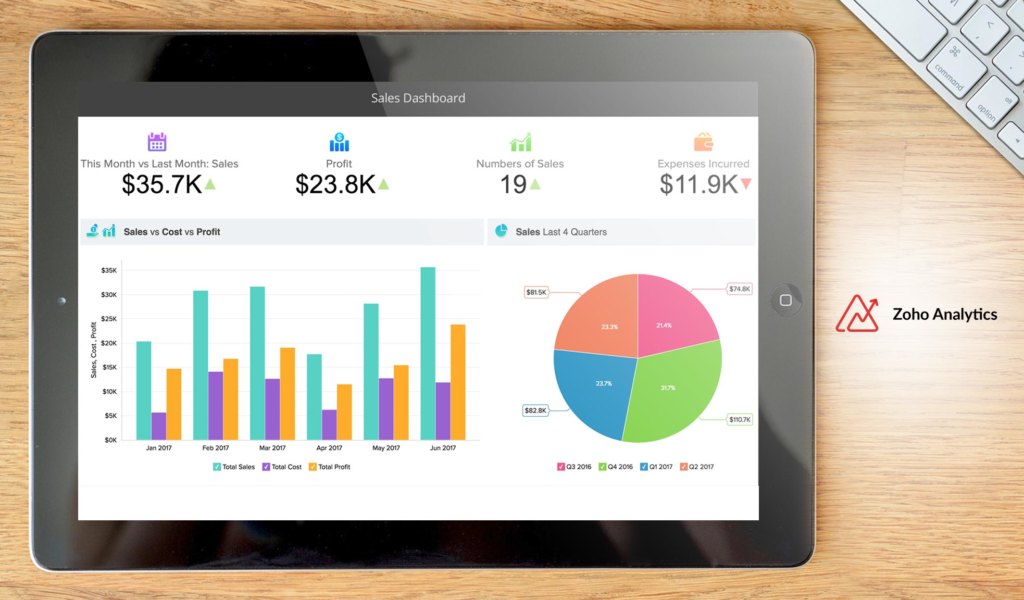
Zoho Analytics (formerly Zoho Reports) is a BI software that enables you to connect to any data source to extract insightful and useful data. The product, like most Zoho software, is exceptional in housing its robust analytics features in an easy-to-use interface. It has intuitive controls and it provides different types of visualizations for creating data-driven stories to help guide company decision-making.
Key features include workspaces, dashboards, automatic report generation, email schedules, formula engine, pivot table, and many more. The self-service BI program also includes collaboration tools and even multi-language support for global companies. You can also access it using your native applications for iOS and Android devices. It, of course, integrates with other Zoho products and many third-party business applications. These include Heroku, MySQL, QuickBooks Online, and Salesforce CRM.
It is offered in tiered plans. But, it has a free version available for smaller operations. Paid plans start at an affordable $30 per month. This price point, combined with its comprehensive feature set makes it one of the best business intelligence solutions out there today.
Detailed Zoho Analytics Review
3. Qualtrics Research Core – Free
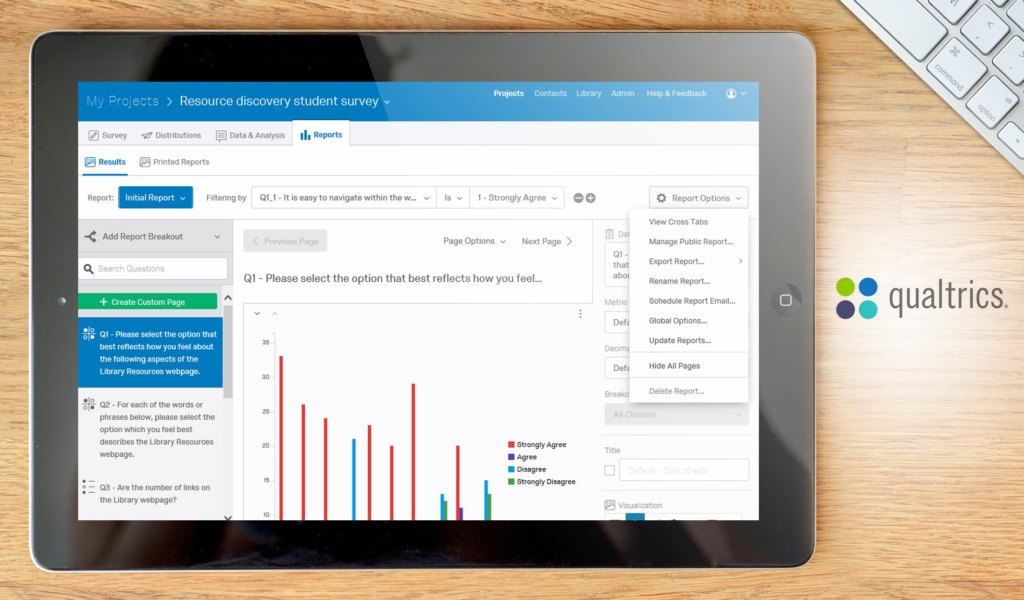
Qualtrics Research Core is one of the best enterprise-level market research platforms today. It is primarily used for surveys and market research. However, it is flexible enough to be used for internal qualitative data gathering and generating actionable data. Aside from consumer market research, it is also being used by companies to gather internal data for other business functions. These include HR, IT, management, and many more.
Its core features include statistical analysis, multi-channel survey management, naming and concept testing, user experience monitoring, and shopper research. It even has a compensation management module to optimize the internal use of resources.
Another great thing about Qualtrics Research Core is that it doesn’t only offer a free trial but also a free account with great capabilities. It includes one action survey with unlimited questions with eight question types and has no expiration date. There are also upgrades available should your needs exceed the free plan’s capability.
Detailed Qualtrics Research Core Review
4. Looker – By quote (Has a startup solution)
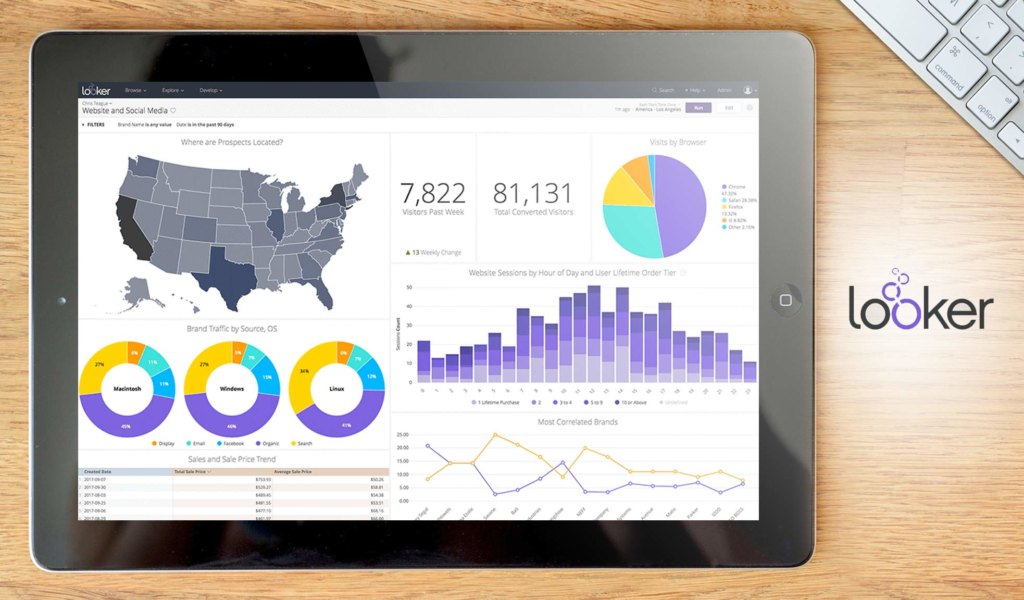
Looker is a BI platform that uses SQL to harness data analytics and get real value from data. It enables the use of familiar business terms when asking sophisticated questions. Looker has a Startup Analytics designed for early-stage startups. This ensures insights aren’t lost from apps and tools that don’t talk to each other.
The data analytics platform simplifies getting and querying data into and out of a single database or warehouse. This allows Looker to perform its SQL-based queries that even non-technical employees can do without the help of your IT specialist. Built for startups, it also ensures you own your data from any source and empowers your team using deep startup analytic insights. Since the pricing information of Looker is only available upon request, getting in touch with the vendor is required.
Detailed Looker Review
5. Reveal – Starts at $9.99
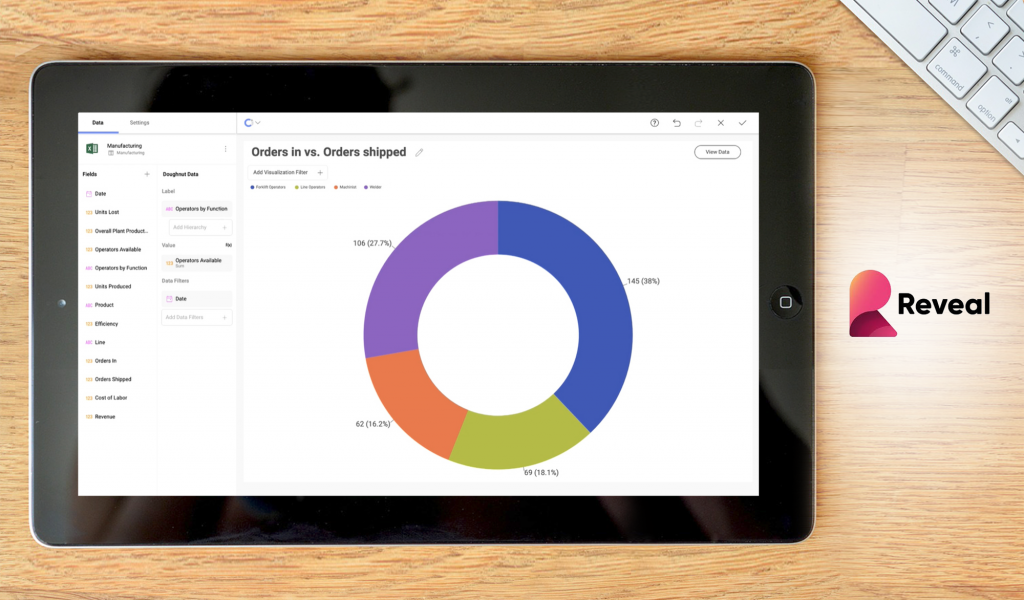
Reveal an affordable business intelligence (BI) tool built for businesses that want to make data-backed decisions from their onset. The platform allows startups to analyze data and create visualizations that drive faster and better decision-making. The best part is that you can create and view visualization anytime, anywhere, and on any device including desktop, Android, iOS, and on the web.
With the drag-and-drop interface, businesses can use more than 30 chart types to display key metrics and gain a 360-degree view of business performance. Even better, it’s easy to export dashboards and share them with clients and team members. Moreover, Reveal enables startups to securely access data from different sources including Box, Google Drive, OneDrive, Google Spreadsheets, and Dropbox. The vendor offers a comprehensive free trial to get you up to speed with the features.
Detailed Reveal Review
6. QlikView – Free
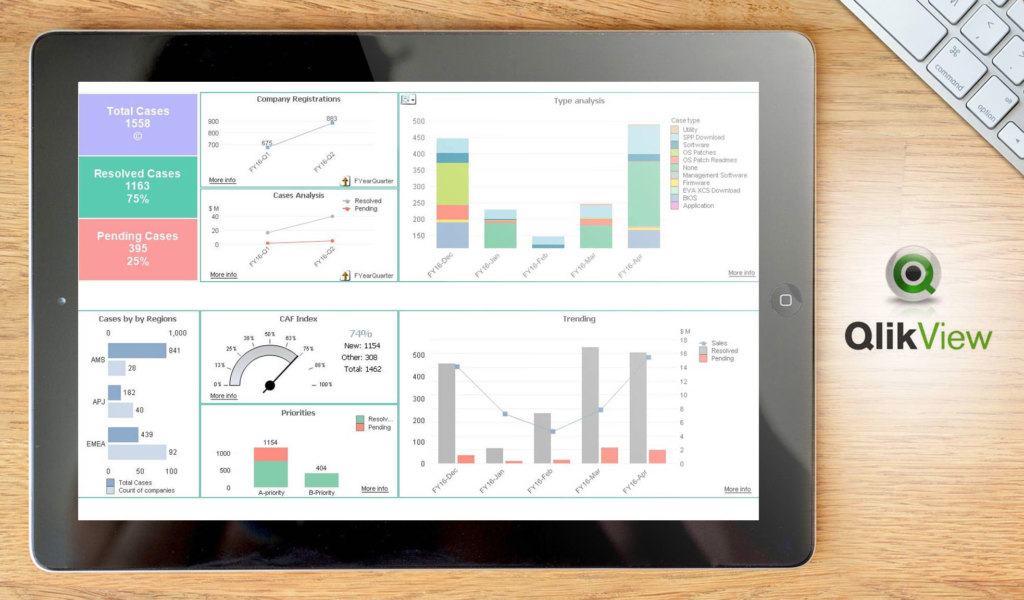
QlikView, a BI data discovery product, helps you create dashboards and guided analytics applications. It’s available for free for its personal edition. This means your startup gets unlimited access at no cost. There’s also an enterprise edition with licenses based on server, document, user, or application with pricing information available upon request.
Its guided analysis paths are customizable and tightly governed so you can easily create business-driven data discoveries. Your team can uncover insights and make meaningful decisions in attractive analytic experiences. Technical knowledge isn’t required as its easy to use for creating and deploying analytics apps. Depending on your startup’s suitable deployment model, you can choose from using it in the cloud or purchasing its license, or combining both options.
Detailed QlikView Review
7. Microsoft Power BI – Free
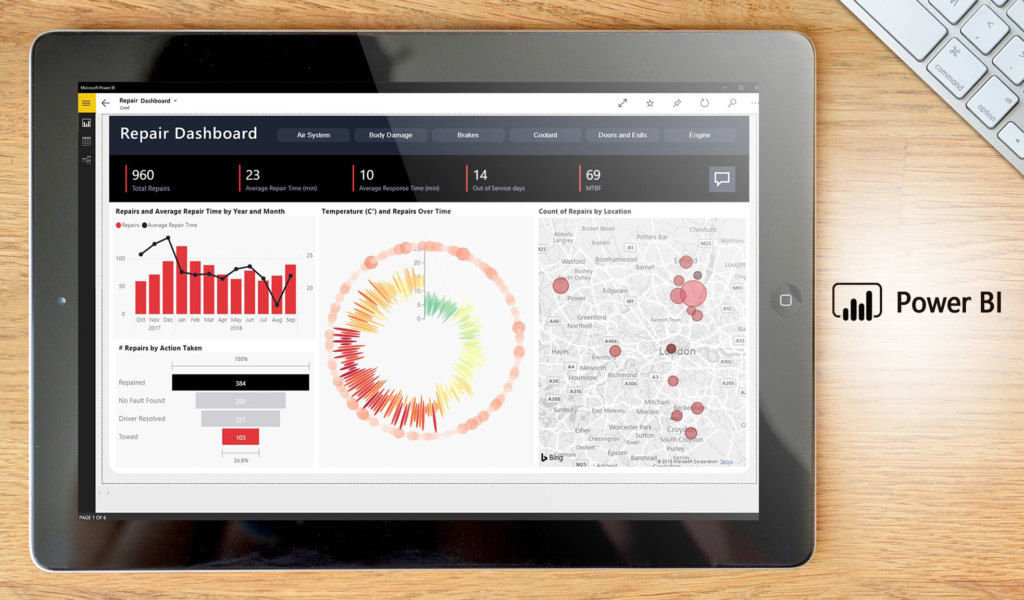
Microsoft Power BI is a common alternative for startups that want to upgrade from their Excel and Google Sheets. It’s a desktop tool that can be downloaded for free. In addition, it also has a Pro edition that’s suitable for teams to share and collaborate starting at $9.99 per user per month.
It has a good array of data connectors and it’s efficient for building dashboards and data preparation. Visual tools enable you to clean and prepare data. You can also analyze and create reports with custom visualizations. Meanwhile, the premium option for startups provides dashboards with 360-degree, real-time view of your business and automatically updated data.
Detailed Microsoft Power BI Review
8. Google Analytics – Free

Google Analytics is an essential resource used by startups to get started in measuring analytics goals, especially for startup marketing. Furthermore, this web analytics service is available for free which means you can easily utilize its features without spending anything.
The tool provides you with the most basic and relevant metrics you should focus on such as your traffic sources, content consumption, and content engagement. It effectively summarizes data into high-level dashboards and it works with a couple of funnel visualization techniques. Even if you’re using other BI tools, Google Analytics is still a requirement which is why many programs connect with this data source.
Detailed Google Analytics Review
9. Statsbot – Free
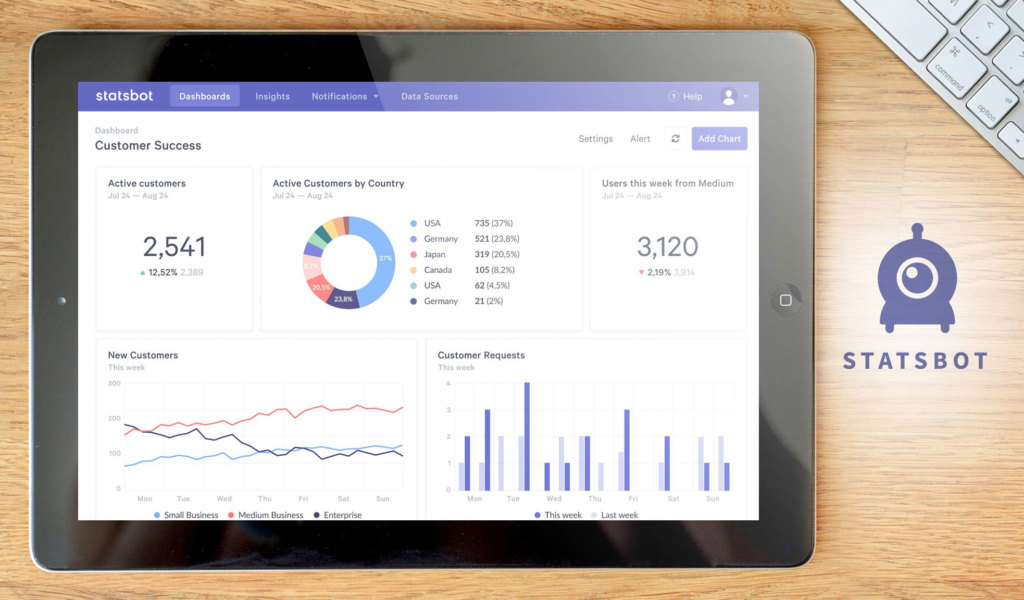
Statsbot is a BI tool that streamlines data tracking. With a data-centric approach, it gives your team a single language of data communication, proactive analytics with automated triggers, and access for everyone in the team. It also has ad-hoc insights that even non-tech people can ask questions in a natural way. Additionally, it has smart notifications and advanced data sharing.
Startups can use Statsbot starting from its Free plan for 5 users with 50 scheduled report messages per month, an unlimited number of profiles for Salesforce, Stripe, Mixpanel, and Google Analytics, and dashboard and insights. The free plan is generously featured with necessary features for startups to get started with utilizing business intelligence.
Detailed Statsbot Review
10. Visualr – By quote
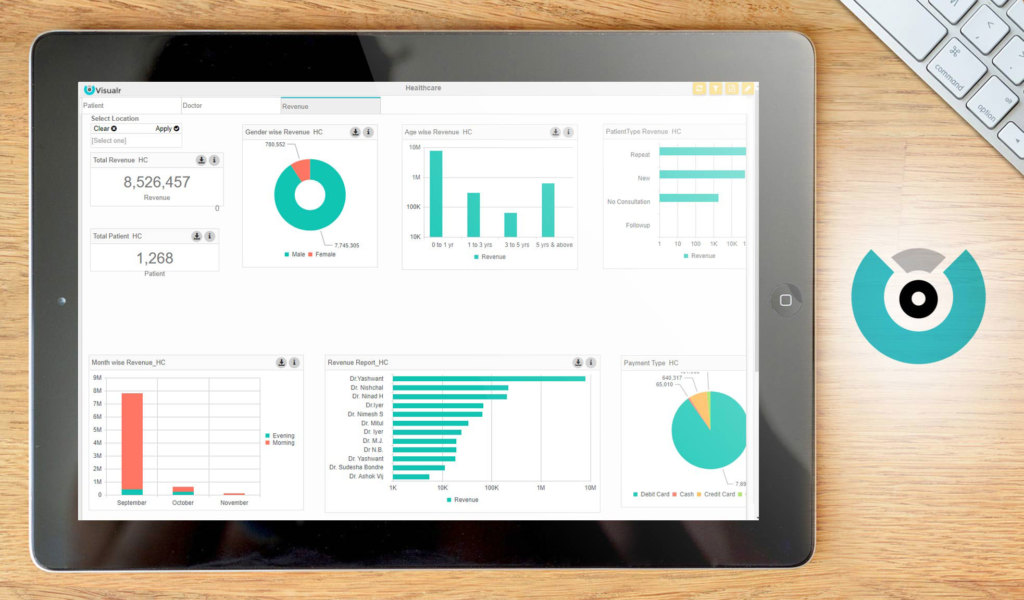
Visualr is a business intelligence service that specializes in the visualization of data. It’s a data visualization tool that transforms complex data sets into charts and dashboards in real-time. As its specialty, decoding and understanding data is streamlined and the flow of information is continuous. You can easily implement the system with no programming language skills needed using its drag-and-drop feature.
Additionally, Visualr also offers economical pricing for its server and desktop versions which is available by quote. The license is perpetual and the software is upgraded from time to time which is a cost-effective solution to get a good value for your investment.
Detailed Visualr Review
Take Advantage of These Free Plans
Startups today should take advantage of free business intelligence software solutions, especially with the world going digital. Even though these are not up to the level of their premium counterparts, they are way significantly better than legacy spreadsheet software. Thus, if you want to make data-driven decisions, it just might be the right time for you to see what these free tools can offer.
The ones we listed are the top 10 leading business intelligence tools out there for small or new companies. The cost of using them is close to nil. Moreover, they are very easy to use, making their out-of-the-box usability quite pretty high. They possess statistical tools and even support multi-channel data gathering and curation. Moreover, as they are free, you can always try them out with no long-term commitment. You can start with the top product, Wyn Enterprise.
However, if they don’t quite live up to your needs and you have the budget, you can try their premium plans or check out what we rank as the best business intelligence tools for small and big businesses. The guide will walk you through the unique features of each platform, including the possible benefits they can afford you.
Moreover, you should also keep up with business intelligence trends. In this way, you will be able to be up to date not only on what new tools and features are coming but also on the best practices in the industry.
Key Insights
- Affordable Solutions: The article lists 10 affordable BI solutions for startups, highlighting free and low-cost options.
- Wyn Enterprise: Offers a flat-fee licensing model without per-user fees.
- Zoho Analytics: Free version available; paid plans start at $30/month.
- Qualtrics Research Core: Free account with robust capabilities.
- Looker: Custom pricing with startup solutions.
- Reveal: Starts at $9.99/month.
- QlikView: Free personal edition available.
- Microsoft Power BI: Free desktop version; Pro edition starts at $9.99/month.
- Google Analytics: Free, essential for measuring marketing analytics.
- Statsbot: Free plan for 5 users.
- Visualr: Custom pricing focused on data visualization.
- Benefits of BI for Startups:
- Data-Driven Decisions: BI tools help startups make informed decisions based on data analysis.
- Cost Efficiency: Free and low-cost BI tools are accessible to startups with modest budgets.
- Scalability: Many BI tools offer scalable options, allowing startups to upgrade as they grow.
- Pivoting Capability: BI solutions help startups pivot by analyzing market conditions and making necessary adjustments.
- Ease of Use: Modern BI tools offer user-friendly interfaces, reducing the need for extensive technical knowledge.
- Key Features to Look for in BI Tools:
- Data Visualization: Essential for quick and easy interpretation of data.
- Key Performance Indicators (KPIs): Critical for tracking relevant business metrics.
- Ad-Hoc Queries: Allows users to perform specific data inquiries on the fly.
- Affordability, Ease of Use, Customizability: Important buying factors for startups.
FAQ
- What is the most affordable BI solution for startup companies? Wyn Enterprise is a reasonably priced BI solution due to its flat-fee licensing model, which provides greater control over BI spending without increasing licensing fees or imposing data limitations.
- Why is business intelligence important for startups? Business intelligence helps startups process data to create actionable insights, enabling them to understand the market better, identify opportunities and threats, and make data-driven decisions to gain a competitive edge.
- Can startups benefit from free BI tools? Yes, many BI tools offer free versions or plans that provide essential features for startups, allowing them to leverage data analytics without significant financial investment.
- How can BI tools help startups in the early stages? In the early stages, BI tools can assist startups in market analysis, product development, and performance tracking, helping them to establish product-market fit and make informed strategic decisions.
- What features should startups look for in a BI tool? Startups should look for features such as data visualization, key performance indicators (KPIs), ad-hoc queries, affordability, ease of use, and customizability to meet their specific needs.
- How do BI tools support startup growth and scalability? BI tools provide scalable solutions that allow startups to start with basic features and upgrade to more advanced options as they grow, ensuring continuous support for data-driven decision-making.
- Are there any BI tools specifically designed for startups? Yes, some BI tools like Looker offer specific solutions designed for early-stage startups, ensuring they can access and analyze data effectively even with limited resources.
- How can BI tools facilitate pivoting for startups? BI tools help startups gather and analyze relevant data from various sources, allowing them to make informed decisions about changing products or markets to adapt to evolving business conditions.




























Leave a comment!